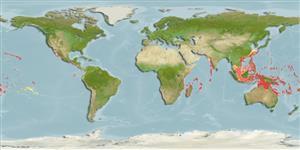Common names from other countries
>
Carangaria/misc (Various families in series Carangaria) >
Sphyraenidae (Barracudas)
Etymology: Sphyraena: Greek, sphyraina, -es = the name of a fish (Ref. 45335).
Issue
References and information for Hawaii are retained (including common names). All other references from different study areas are questionable or refer to another species of Sphyraena.
Environment: milieu / climate zone / depth range / distribution range
экология
морской ассоциированный с рифами; пределы глубины 10 - 104 m (Ref. 58302). Subtropical; 23°N - 18°N, 161°W - 154°W (Ref. 123366)
Eastern Pacific: Hawaii endemic.
Size / Вес / Возраст
Maturity: Lm ? range ? - ? cm
Max length : 54.6 cm SL самец/пол неопределен; (Ref. 123366); наибольший вес (опубликованные данные): 1.8 kg (Ref. 4887)
колючие лучи спинного плавника (общее число) : 6; членистые (мягкие) лучи спинного плавника (общее число) : 9; колючие лучи анального плавника: 2; членистые (мягкие) лучи анального плавника: 8 - 9. This species is distinguished by the following set of characters: first gill arch with one gill raker; pelvic-fin insertion is located slightly before vertical through first dorsal-fin origin; pored lateral-line scales 121-127, total lateral-line scales 132-134; scales above lateral line 12-13 and below 14-15; snout comparatively long, its length 15.0-16.4% SL; upper jaw long, the posterior tip reaching to or beyond anterior nostril, but not reaching to below posterior nostril, its length 11.9-12.9% SL; eye large, orbit diameter 4.8-5.9 % SL and depth 4.8-5.6% SL; anal-fin base somewhat short, its length 6.8-7.5% SL; last dorsal- and anal-fin ray lengths 4.2-4.3% SL and 3.6-4.7% SL, respectively; anus is comparatively close to anal-fin origin, its anterior and posterior margins to anal-fin origin 6.5-8.2 % HL and 4.1-4.9% HL, respectively; the head sensory canal pores on suborbital area are simple or sometimes slightly branched, their lowermost parts very close to lacrimal bone margin, large smooth area lacking canal pores absent on mid-margin of lacrimal bone. Colouration: lateral surface of body no stripes or bands; caudal fin gray (Ref. 123366).
Mainly nocturnal (Ref. 4887).
Life cycle and mating behavior
Maturities | размножение | Spawnings | Egg(s) | Fecundities | личинки
Morishita, S. and H. Motomura, 2020. Sphyraena stellata, a new barracuda from the Indo-Pacific, with redescriptions of S. helleri Jenkins, 1901 and S. novaehollandiae Günther, 1860 (Perciformes: Sphyraenidae). Zootaxa 4772(3):545-566. (Ref. 123366)
Статус Красного Списка МСОП (Ref. 130435)
CITES (Ref. 128078)
Not Evaluated
Угроза для людей
Harmless
Использование человеком
рыболовство: коммерческий
дополнительная информация
инструменты
Специальные отчеты
Скачать в формате XML
ресурсы в Интернет
Estimates based on models
Preferred temperature (Ref.
115969): 24.7 - 28.8, mean 27.5 (based on 566 cells).
Phylogenetic diversity index (Ref.
82804): PD
50 = 0.5000 [Uniqueness, from 0.5 = low to 2.0 = high].
Bayesian length-weight: a=0.00724 (0.00339 - 0.01546), b=2.92 (2.74 - 3.10), in cm Total Length, based on LWR estimates for this Genus-body shape (Ref.
93245).
Trophic level (Ref.
69278): 4.5 ±0.80 se; based on food items.
устойчивость к внешним воздействиям (Ref.
120179): средний (среднего размера), минимальное время удвоения популяции 1.4-4.4 года (Preliminary K or Fecundity.).
Fishing Vulnerability (Ref.
59153): Moderate to high vulnerability (47 of 100).
